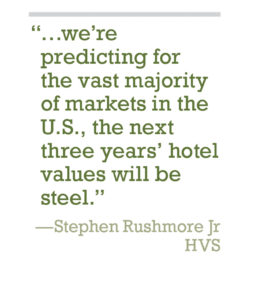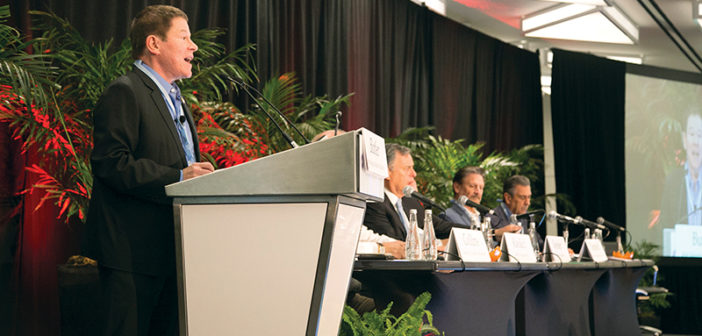LOS ANGELES—Naysayers looking to dampen the industry’s continuing enthusiasm for doing deals at this point in the lodging cycle were out of luck at the 27th annual Meet the Money National Hotel Finance & Investment Conference held here earlier this month.
In casual conversations and organized sessions, some 400 owners, operators, developers, lenders and analysts who gathered at the Hyatt Regency LAX remained more positive than not about the near- to mid-term outlook for lodging, pointing to its still-percolating prosperity and continuing, albeit slowing, RevPAR growth. Even the harbinger of a downward shift—oversupply—failed to elicit the type of dread seen among industry players in years past.
“It’s a very energetic vibe. There’s continued optimism. It isn’t frothy,” conference organizer Jim Butler, chairman of the Global Hospitality Group of Jeffers Mangels Butler & Mitchell LLP, told Hotel Business, describing the overall attitude at the two-day event.
That said, he added, “It seems sort of resigned that things will continue to get better but do so in a more cautious way and that one has to be careful in looking at opportunities and analyze things. I think that’s very healthy for the industry.”
The call for caution could be seen in the conference’s theme: “Opportunity or Peril? Finding the Right Key to the Right Door,” although executives on many of the general session and specialized panels were bullish in their approaches to finding solutions to industry challenges.
Eric Danziger, CEO of Trump Hotels, was in the spotlight at the conference, describing some of the challenges that can occur when your boss becomes president of the United States.
“We sure get a lot more publicity,” quipped the executive, noting he has a different set of challenges than most hotel CEOs since Donald J. Trump landed in the White House.
Danziger said the process of the founder of the company running for president, “of course, had some impact on the business,” in terms of the people in the company and in the marketplace. “When he won the election, it changed the dynamics of the company,” said the CEO, citing EVP Ivanka Trump’s move to Washington, DC, and the close scrutiny the organization has come under “from just about everybody.”
Trump’s presidency has significantly affected the organization’s ability to grow its brands—Trump Hotels and the recently launched Scion—globally.
Danziger acknowledged deals in the pipeline for locations in China, Israel, London and other locations needed to be exited. “We had to withdraw from all of those,” he said.
Still, since he joined the organization in 2015, Danziger said, overall, “It has been an incredible life experience for the last couple of years, which I’ll always remember… I wouldn’t trade it for the world.”
The world and how it’s changing and facing new realities was the key focus of a panel moderated by Tom Morone of CHMWarnick and included Bill Blackham, Condor Hospitality Trust; Phil Cyburt, Monday Properties; David Gilbert, Interval International; Judy Hendrick, Aimbridge Hospitality; and Patrick Hogan, CMB Regional Centers.
“I had to admit coming into 2017, I was a skeptic about where we were going to be,” noted Morone, citing data that advanced several challenges, such as the national debt at about $20 billion, investment crises in Europe, CMBS at record levels coming due this year and next, “a few surprises with the Administration,” and potential interest-rate hikes. “Basically, we had a boatload of indices the recession is on the horizon,” he said.
However, in reevaluating the horizon, Morone said the consensus among his colleagues was it’s a new world full of opportunities. Citing positives, he said, “RevPAR may not have made as many increases as rapidly as it had in 2015, but it’s still positive; we have foreign travel flooding the market; the investor crisis is steady; there’s more big development deals around the country.”
Blackham noted his own company underwent a significant shift two years ago (after changing its name from Supertel Hospitality to its current REIT name) and went through “a rapid disposition” of assets and changed the capital structure of the company, among other things. The CEO noted the focus is on select- and limited-service hotels, as well as extended-stay, upper-midscale and upscale premium-branded hotels in the top 100 U.S. MSAs.
As a differentiator, Blackham said the company “deals in assets that are new in age; not more than 10 years old… The average age of our acquisitions so far is four years old. The products that we’re buying and the locations of the products are very specifically oriented toward people who are younger, 40 years old.”
Cyburt of New York-based Monday Properties, which focuses on boutique and upscale hotels in top-tier markets such as Los Angeles, San Francisco and Washington, DC, explained, “We see some great opportunities. It’s not like just buying right; you really have to segment the asset correctly in what you’re buying… We do a good job of differentiating ourselves in having nimble capital in the investment space and finding opportunities in more scalable markets. A lot of capital is coming to the West Coast.”
With some 500 hotels under management, Aimbridge’s Hendrick indicated while things may change, maintaining relationships is key to doing business. “Our relationships are with hotel owners that we manage for, and that is what we try to make our core value around because if we don’t have hotel owners, we don’t have a business,” she said.
Additionally, there’s a focus on being “in front of the capital because we think if you’re chasing capital, you’re already losing the game,” Hendrick added.
With the EB-5 Regional Center program saved from sunsetting and extended through this September 30, Hogan was hopeful the investment vehicle would remain in effect beyond that date. “The program certainly has been in the news with problems; however, it’s an unbelievably good program. CMB has raised $2.5 billion in EB-5 capital and we combine that with around $10.5 billion in private capital for somewhere in the neighborhood of about $12 billion in projects throughout the United States. In hospitality, we’ve raised approximately $800 million and combine that with other capital for about $3 billion in hospitality projects, most notably here in Los Angeles [where]the Century Plaza is under construction right now. We raised $450 million for that project and we did it in about seven months under the EB-5 program,” said Hogan.
The CEO characterized CMB like a bank or mezz lender, but one concentrated on jobs creation. “This is all determined on how many jobs the project would create; that’s how many dollars we can lend. It’s not the traditional loan,” said Hogan.
Mike Cahill, founder/CEO of HREC Hospitality Investment Advisors and co-chairman of LIIC-The Lodging Industry Investment Council, showcased this year’s Top 10 LIIC survey results, which proved more positive than last year’s findings.
Highlights showed Chinese investment is expected to slow slightly and Brexit’s impact on U.S. hotels appears slight. Private equity followed by publically traded REITs are forecast to dominate buys of upscale to luxury hotels, while regional owner/operators are projected to do the same in the economy to upper-midscale hotels.
Other key takeaways showed 54% forecast lodging real estate values will be flat in comparison to 2016 while 36% predict a slight increase in values (up to 5%), with favored properties for investment occupying the upper-upscale segment.
Also, the top three greatest challenges to hotel investment include new lodging supply, which 90% of LIIC members cited as the current concern even as 81% indicated they are building new hotels; increasing interest rates; and government-mandated minimum-wage increases. The survey showed investors (28%) are also threatened by the latter and the corresponding impact on hotel operating costs. 
Stephen Rushmore Jr., president/CEO of HVS, said the biggest force that could impact hotel values is government policy. “That includes things like interest rates, corporate taxation, or even policies that impact the construction process of hotels,” he said. “So there’s tremendous amount of uncertainty there, but if you eliminate the governmental forces that impact hotel values, we’re predicting for the vast majority of markets in the United States, the next three years’ hotel values will be steel.”
Rushmore noted in terms of supply, despite chatter and concern, “Really it’s not going to have any significant deteriorating effect on hotel values for the next couple of years.” He added, “A lot of new supply that is coming on the market is being absorbed with enough demand to cover the new inventory. Supply really for the most part—because there will be exceptions—should not really be a risk to valuations.”
In terms of demand, STR’s Steve Hennis observed transient business has grown 36% since the last cycle. “When we look at the group-demand segment, that’s been relatively flat, and that’s really the area we’re seeing having the biggest issue. We’re not seeing a lot of group business filling up the full-service and luxury hotels that have meeting space. That’s one of the reasons we’re not seeing that much development in those segments,” said Hennis.
Butler noted he was happy with the diversity of opinion and approaches that permeated the conference, such as on an owner panel regarding acquisition and disposition.
“These are very successful owners and investors. One point of view was focusing on the urban markets, like Highgate Hotels building a dominant position in New York or L.A. Other strategies are exactly the opposite: to go for the secondary and tertiary markets but, perhaps, to stay in urban areas in those markets. So, I’m seeing a divergence of approach and energy and creativity,” said Butler, who noted numerous deals get done each year as a result of the deliberately small-scale event and its networking opportunities.
“That’s something that really makes me happy,” he said. HB


